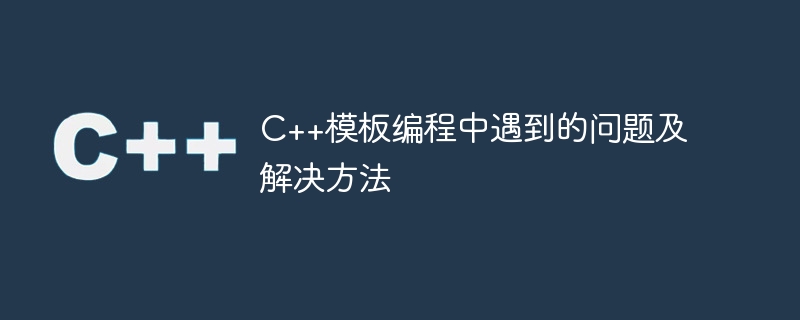Home >Backend Development >C++ >Problems encountered in C++ template programming and their solutions
Problems encountered in C++ template programming and their solutions
- WBOYWBOYWBOYWBOYWBOYWBOYWBOYWBOYWBOYWBOYWBOYWBOYWBOriginal
- 2023-10-09 14:22:55765browse

Problems and solutions encountered in C template programming
Introduction:
C template is a powerful and flexible tool that can be used when writing code Implement generic programming at the same time to improve code reusability and scalability. However, as the complexity of the project increases, we may encounter some common problems. This article discusses these issues and provides workarounds and specific code examples.
Problem 1: Conflict between template specialization and overloading
Template specialization and function overloading are commonly used techniques in C. However, in some cases, template specializations and function overloading may conflict, causing compilation errors.
Solution:
We can use some techniques in template specialization and function overloading to avoid this conflict.
#include <iostream>
template <typename T>
void func(T t) {
std::cout << "Template Function: " << t << std::endl;
}
template <>
void func<int>(int i) {
std::cout << "Specialized Template: " << i << std::endl;
}
void func(double d) {
std::cout << "Overloaded Function: " << d << std::endl;
}
int main() {
func(3); // 使用特化的模板函数
func(3.14); // 使用重载的函数
return 0;
}Run result:
Specialized Template: 3 Overloaded Function: 3.14
Problem 2: Parameter derivation error of template function
Template functions usually use parameter derivation to determine the type. However, in some cases parameter deduction may fail, causing compilation errors or unexpected behavior.
Solution:
We can use type qualification to help the compiler correctly deduce parameter types.
#include <iostream>
template <typename T>
void func(T t) {
std::cout << "Template Function: " << t << std::endl;
}
int main() {
func<int>(3); // 显示指定模板类型
func(3.14); // 编译器自动推导类型
return 0;
}Run results:
Template Function: 3 Template Function: 3.14
Question 3: Separation of definitions and declarations of member functions of template classes
Member functions of template classes usually need to be separated between the declaration and definition of the class , which brings certain challenges to the readability and maintainability of the code.
Solution:
We can use member functions defined inside the template class to avoid separating declaration and definition.
#include <iostream>
template <typename T>
class MyClass {
public:
void func(T t) {
std::cout << "Template Class Function: " << t << std::endl;
}
};
int main() {
MyClass<int> myObj;
myObj.func(3);
return 0;
}Running results:
Template Class Function: 3
Problem 4: Code bloat caused by template instantiation
When we use the same template type for instantiation in multiple places, it may This causes code bloat, increasing compilation time and executable file size.
Solution:
We can use external templates and explicit instantiation to avoid code bloat.
// 外部模板声明
extern template class MyClass<int>;
// 显式实例化
template class MyClass<int>;
int main() {
MyClass<int> myObj;
myObj.func(3);
return 0;
}Question 5: Template dependencies
C templates support nested use, that is, one template can be used as a parameter of another template. However, in some cases, template dependencies can cause compilation errors.
Solution:
We can use type aliases or template specializations to resolve template dependencies.
#include <iostream>
template <typename T>
struct Base {
void func() {
std::cout << "Base Function" << std::endl;
}
};
template <typename T>
struct Derived {
using BaseType = Base<T>;
void func() {
BaseType base;
base.func();
}
};
int main() {
Derived<int> derivedObj;
derivedObj.func();
return 0;
}Running results:
Base Function
Summary:
C template programming is a powerful technology, but it will also encounter some problems in practice. Through reasonable solutions and techniques, we can solve these problems, give full play to the advantages of templates, and improve the efficiency and maintainability of the code.
Keywords: C, template programming, problems, solutions, code examples
The above is the detailed content of Problems encountered in C++ template programming and their solutions. For more information, please follow other related articles on the PHP Chinese website!
Related articles
See more- C++ compilation error: A header file is referenced multiple times, how to solve it?
- C++ compilation error: wrong function parameters, how to fix it?
- C++ error: The constructor must be declared in the public area, how to deal with it?
- Process management and thread synchronization in C++
- How to deal with data splitting problems in C++ development

